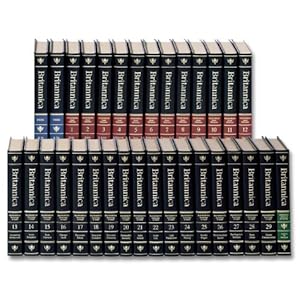Strange topic to randomly consider, I know. But when I saw my nearly 7-year-old sister this past weekend and how big she's getting, how much she's learning in school, how well she's reading, etc. it also hit me that she's going to start doing research projects soon. Oof.
Not sure why that "hit" me like that--I guess because I always enjoyed doing them and learning about something new. I loved flipping through our set of Encyclopedia Britannicas searching for something specific but finding a thousand other random facts in the process. And it made me realize how different the process will be for her than it was for me.

Where I had to dig through thick, hardcover books and scour library shelves for the right tome, she'll be using search engines and finding things at the click of a button. Personally, it struck me as somewhat sad. Yes, there is an abundance of knowledge to be gained out there in this new digital world but you really only find what you're looking for. You don't randomly come across new topics or weird exotic animals to learn semi-useless facts about.
But then I saw a link to an article in the San Francisco Chronicle titled "Britannica Published E-Books for Schools, Libraries."
You can imagine my delight.
Students in elementary school through college can easily access hundreds of high-quality books on the subjects they're studying through a new Web-based e-books service available to schools and libraries from Britannica Digital Learning.
The new service, at ebooks.eb.com, makes it easier than ever to use Britannica's expert-written single-volume titles for research, papers, homework and projects. More than 300 non-fiction digital books are now available. They cover the full range of curriculum, including math, science, language arts, social studies and health.
Each e-book contains the entire text of the print edition and illustrations - many of which are striking, high-definition and full-color. Tables of contents, indexes and glossaries are hyperlinked and fully searchable.
"These books are extremely valuable in digital form. They can be searched by several students at once, making them more accessible and useful than a single bound book," said Michael Ross, senior vice president and general manager of Britannica Digital Learning.
E-books are whiteboard ready, making them ideal for use both in small classrooms and large lecture halls. Schools do not have to spend additional funds on reading devices; these e-books can be accessed 24/7 by students, teachers, and library patrons through any Web connection. All titles in a school's or library's holdings can be searched with a single keyword. Password-protected notes can be saved and the material can be printed.
Britannica plans to add hundreds of additional e-book titles in the next few years. The first 15 pages of each title are available free at ebooks.eb.com. Pricing, titles and more are available at 1-800-621-3900.
I just hope that at least SOME kids use them the "old-fashioned" way.

That's great! I remember in my art classroom in high school we had encyclopedias for reference. I was working on a project (designing a cover for the book I was writing) and needed to draw an eagle. So I grabbed the encyclopedia. I also used our encyclopedia set (World Book not Brittanica) when I was world-building for that same book. I'd just flip to a random map and find interesting place names that I could tweak to use in my book. It was a lot of fun.
ReplyDeleteThanks for that trip down memory lane. :D